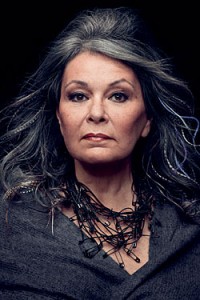
Roseanne Barr in New York Magazine. Some highlights:
It didn’t take long for me to get a taste of the staggering sexism and class bigotry that would make the first season of Roseanne god-awful. It was at the premiere party when I learned that my stories and ideas—and the ideas of my sister and my first husband, Bill—had been stolen. The pilot was screened, and I saw the opening credits for the first time, which included this: CREATED BY MATT WILLIAMS. I was devastated and felt so betrayed that I stood up and left the party. Not one person noticed.
The next battle came when Matt sent down a line for me that I found incredibly insulting—not just to myself but to John, who I was in love with, secretly. The line was a ridiculously sexist interpretation of what a feminist thinks—something to the effect of “You’re my equal in bed, but that’s it.” I could not say it convincingly enough for Matt, and his hand-picked director walked over and gave me a note in front of the entire crew: “Say it like you mean it … That is a direct note from Matt.” What followed went something like this: My lovely acting coach, Roxanne Rogers (a sister of Sam Shepard), piped up and said, “Never give an actor a note in front of the crew. Take her aside and give her the note privately—that is what good directors do.” She made sure to say this in front of the entire crew. Then she suggested that I request a line change. So I did. Matt, who was watching from his office, yelled over the loudspeaker, “Say the line as written!” I said, “No, I don’t like the line. I find it repulsive, and my character would not say it.” Matt said, “Yes, she would say it. She’s hot to trot and to get her husband in bed with her, and give it to her like she wants it.” I replied that this was not what she would say or do: “It’s a castrating line that only an idiot would think to write for a real live woman who loves her husband, you cocksucker.”
When the show went to No. 1 in December 1988, ABC sent a chocolate “1” to congratulate me. Guess they figured that would keep the fat lady happy—or maybe they thought I hadn’t heard (along with the world) that male stars with No. 1 shows were given Bentleys and Porsches. So me and George Clooney [who played Roseanne Conner’s boss for the first season] took my chocolate prize outside, where I snapped a picture of him hitting it with a baseball bat. I sent that to ABC.
But at least everyone began to credit me. I was assumed to be a genius and eccentric instead of a crazy bitch, and for a while it felt pretty nice. I hired comics that I had worked with in clubs, rather than script writers. I promoted several of the female assistants—who had done all the work of assembling the scripts anyway—to full writers. (I did that for one or two members of my crew as well.) I gave Joss Whedon and Judd Apatow their first writing jobs, as well as many other untried writers who went on to great success.
Call me immodest—moi?—but I honestly think Roseanne is even more ahead of its time today, when Americans are, to use a technical term from classical economics, screwed. We had our fun; it was a sitcom. But it also wasn’t The Brady Bunch; the kids were wiseasses, and so were the parents. I and the mostly great writers in charge of crafting the show every week never forgot that we needed to make people laugh, but the struggle to survive, and to break taboos, was equally important. And that was my goal from the beginning.
I finally found the right lawyer to tell me what scares TV producers worse than anything—too late for me. What scares these guys—who think that the perks of success include humiliating and destroying the star they work for (read Lorre’s personal attacks on Charlie Sheen in his vanity cards at the end of Two and a Half Men)—isn’t getting caught stealing or being made to pay for that; it’s being charged with fostering a “hostile work environment.” If I could do it all over, I’d sue ABC and Carsey-Werner under those provisions. Hollywood hates labor, and hates shows about labor worse than any other thing. And that’s why you won’t be seeing another Roseanne anytime soon. Instead, all over the tube, you will find enterprising, overmedicated, painted-up, capitalist whores claiming to be housewives. But I’m not bitter.
Nothing real or truthful makes its way to TV unless you are smart and know how to sneak it in, and I would tell you how I did it, but then I would have to kill you. Based on Two and a Half Men’s success, it seems viewers now prefer their comedy dumb and sexist. Charlie Sheen was the world’s most famous john, and a sitcom was written around him. That just says it all. Doing tons of drugs, smacking prostitutes around, holding a knife up to the head of your wife—sure, that sounds like a dream come true for so many guys out there, but that doesn’t make it right! People do what they can get away with (or figure they can), and Sheen is, in fact, a product of what we call politely the “culture.” Where I can relate to the Charlie stuff is his undisguised contempt for certain people in his work environment and his unwillingness to play a role that’s expected of him on his own time.
I have nothing to add. Read it all, for real.